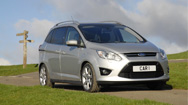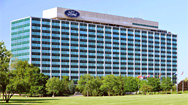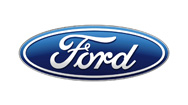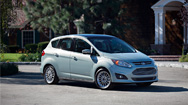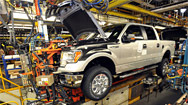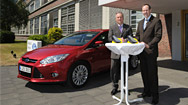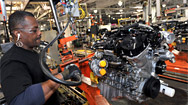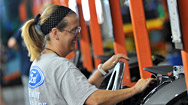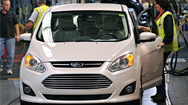Dealers
Our dealers are a source of strength. They are a critical part of our success and important economic contributors to their communities. They represent the face of Ford to our customers and communities and provide employment, tax support, leadership and customer service. As of year-end 2012, our 3,286 Ford and Lincoln dealers in the U.S. employed 189,000 individuals, with an annual payroll of approximately $7 billion. Worldwide, we had 11,619 Ford and Lincoln dealerships as of year-end 2012.
As part of our continuing efforts to improve the Ford retail customer experience and to create loyal advocates of our products and services, we began working collaboratively with our U.S. Ford dealers to improve dealership facilities. In addition, we began working with our Lincoln dealers to focus our mutual efforts on the transformational change necessary to meet the high expectations of the luxury customer, including upgrading dealership facilities and the services provided at those dealerships.
U.S. Ford dealers were more profitable on average last year than in 2011, as lower inventory costs and higher demand for our new and freshened models increased new vehicle sales.
Engaging with Dealers
Dealer relations are a key priority for us. The Ford and Lincoln Dealer Council provides a forum for open dialogue between Dealer Council members and Ford. Through the Council process, dealers can voice their concerns, needs and ideas for working more productively as a team. Also, dealers annually identify their priorities, which are published along with Ford management responses, providing transparency to the discussions between the Company and its dealers.
To ensure that communication lines remain open, Dealer Council members also participate as members of National Dealer Advisory Panels. The current Dealer Advisory Panels, and the topics they address, are as follows:
- Commercial Truck Advisory Board (CTAB) – sales, marketing and product programs
- Consumer Experience Committee (CEM) – opportunity areas to assist dealers, including consistency within Ford, warranties, single point of contact, empowerment, recognition, communication
- Customer Viewpoint Advisory Panel – customer satisfaction rating system, Viewpoint survey
- Dealer Product Advisory Committee (DPAC) – current and future product cycle plan, including lineup, design, styling and color/trim
- Fixed Operations Strategic Advisory Board – mutual fixed operations business growth opportunities
- Ford Credit Dealer Advisory Board – vehicle financing and competitiveness
- FordDirect Dealer Advisory Board – new products and services
- Government Affairs Committee – advice to Ford Motor Company’s Government Affairs office on federal and state automotive legislative issues that have major implications to the business and industry
- Marketing Dealer Advisory Board (MDAB) – vehicle packaging strategy, advertising creative, incentive programs for Ford
- Parts and Service Manager Advisory Committee (PSMAC) – fixed operations programs, including employee recognition/retention
- Retail Experience of the Future (REOF) – third-party aggregators
- Training Advisory Board (TAB) – dealership employee training and recognition
- Young Leaders Committee – millennial perspective on the future of the business, specifically growth in demand for small cars
The feedback gathered through these interactions has helped us develop programs, change policies and enhance processes to improve customer handling and other significant elements of dealers’ businesses.
In addition to the feedback provided through the Dealer Council and Advisory Panels, dealer satisfaction is measured in various ways, including the biannual survey of the National Automobile Dealers Association (NADA) as well as day-to-day interaction with our dealers. Approximately 64 percent of our dealers provided feedback through the summer 2012 NADA survey process. We remained consistent in many areas in this survey compared to our winter 2011 record improvements, including in our Regional Sales, Service and Parts Personnel rankings. In addition, Ford Motor Credit Company Capability rankings exceeded the industry and previous scores in nearly every category. Finally, Senior Management Effectiveness, Dealer Communications, Marketing and Vehicle Incentives also showed favorable results.
Dealer Diversity
Diversity and inclusiveness are part of Ford’s DNA, and growing a strong minority presence in our dealerships is very important. At year-end 2012, Ford had 167 minority-owned dealerships, which represents 5.1 percent of our 3,286 U.S. dealerships. We continue to work with our dealers to provide a foundation for a stronger future for ethnic minorities in all aspects of the industry through the creation of a unified minority dealer group – the Ford Minority Dealer Association (Ford MDA). Working together, we have developed a ONE Ford approach to minority dealer operations by focusing on five key strategies to promote, sustain and grow ethnic minority representation of Ford Motor Company brands. With a focus on education and creating awareness, the Ford MDA will create minority retail career opportunities, enhance dealer profitability and viability and identify multicultural marketing opportunities and community involvement.
Dealer Sustainability Program
We continue to expand the “Go Green” Dealer Sustainability Program we launched in 2010, as dealers can now receive a Go Green energy assessment through the Ford Electric Vehicle (EV) Program. The goal of the Go Green program is simple: to collaborate with dealers to implement cost-effective ways to improve the energy efficiency of their facilities. Going forward, the Go Green program will continue to be a key component of our Ford Dealer Electric Vehicle Program as we expand our EV model offerings and EV dealer network. As part of the certification process to sell EVs, Ford EV dealers undergo an energy assessment to identify opportunities to reduce their overall carbon footprint and lower their energy expenses.
Ford established an Energy Team to manage the energy assessments, and we partnered with Harris Lighting and NEEM, Inc. – global leaders in energy consulting – to complete the actual assessments. Statistical data from the first phase of our Ford Electric Vehicle Program reveals an average dealer annual cost savings opportunity of more than $40,000 per year, or 29 percent of their energy costs, with an average dealer payback period estimated at 3.1 years. As of March 2013, more than 600 dealers in 48 states have completed our EV certification, including the energy assessment process, and more than 200 additional dealers have signed up to undergo the process during the remainder of 2013. For more information on Ford’s EV dealer certification process please see the Electrification section.
In addition, beginning in 2013 the Go Green energy assessment will be an integral component of our U.S. Ford facility renovation program. Our goal to renovate more than 700 U.S. Ford Motor Company branded facilities during the next few years presents a tremendous opportunity for green technology implementation within our dealer network.

